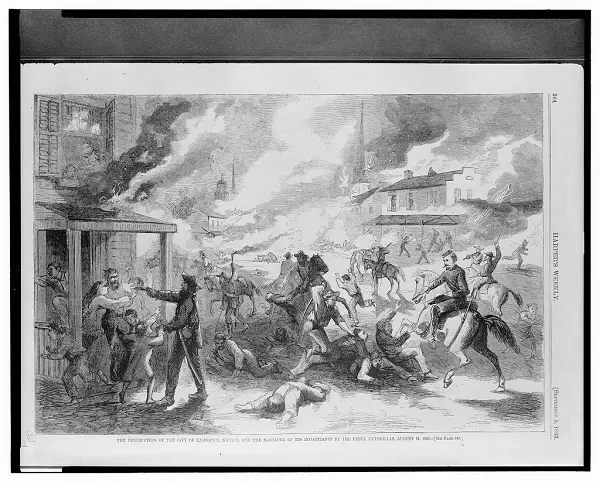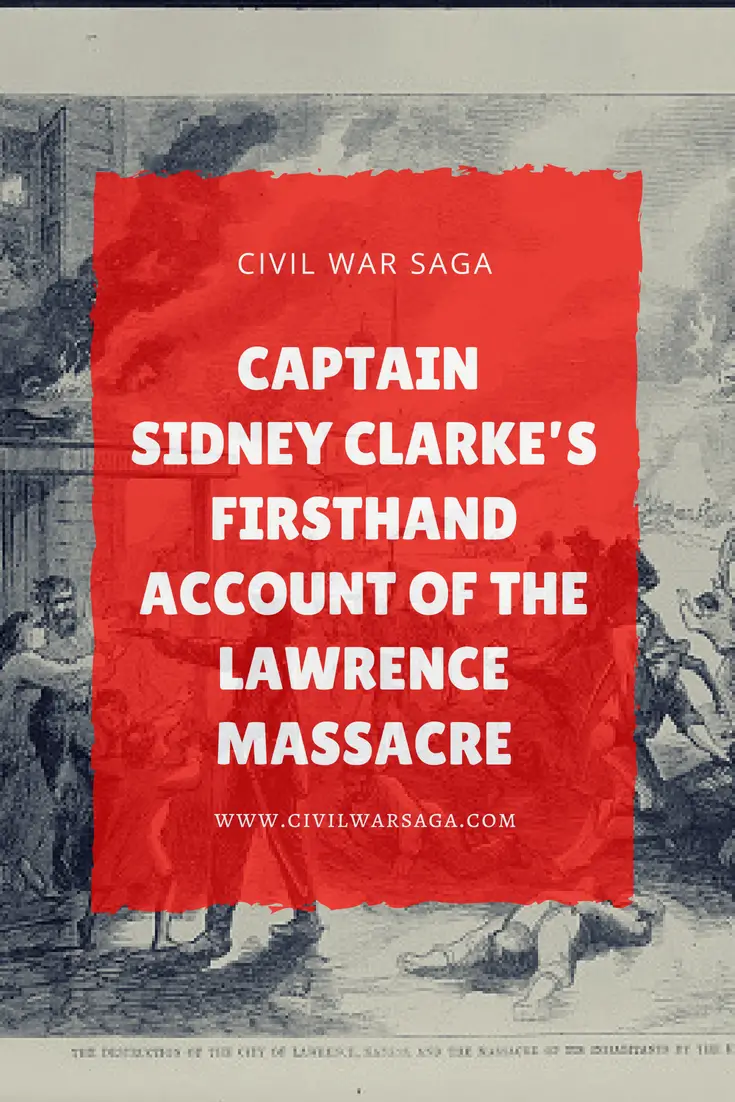On August 21, 1863, a group of Confederate guerrillas called Quantrill’s Raiders, led by William Quantrill, raided the pro-Union town of Lawrence, Kansas.
The raiders killed close to 200 men and boys and stole hundreds of thousands of dollars from residents and businesses in the town.
It is believed the group targeted the town not only because of its pro-Union stance but because it also served as a center for militia and vigilante groups such as Jayhawkers and Redlegs, who were know for attacking farms and plantations in Missouri’s pro-slavery counties.
According to the book William Quantrill: His Life and Times, Quantrill himself admitted he raided Lawrence to “plunder, and destroy the town in retaliation for Osceola” (a Union attack on Osceola, Mo in September of 1861.)
Quantrill’s Raiders were never caught or punished for their actions in Lawrence and later went on to commit similar atrocities, with the help of Jesse James, at Centralia, Mo in 1864.

“The Destruction of the City of Lawrence, Kansas and the Massacre of its Inhabitants by the Rebel Guerrillas, August 21, 1863.” Harper’s Weekly illustration published September 5, 1863
Below is a firsthand account of the massacre from Captain Sidney Clarke, who was serving as both a captain and an acting assistant Provost-Marshal-General for Kansas at the time of the incident:
“August 25, 1863, Leavenworth City, Kans.,
Captain Sidney Clarke to Colonel James B. Fry
HDQRS. ACTG. ASST. PROVOST-MARSHAL-GENERAL
FOR KANSAS, NEBRASKA, COLORADO, AND DAKOTA,
Leavenworth City, August 25, 1863.
Col. JAMES B. FRY,
Provost-Marshal-General, Washington, D.C.:
COLONEL: I have the honor to submit for your information the following brief report of facts connected with the destruction of Lawrence, and the books, records, and enrollment lists of the provost-marshal’s office for the Southern District of Kansas. I make this report from personal observation, as I was in Lawrence on the morning of the massacre and barely escaped the clutches of the guerrillas. The attack was made by the notorious guerrilla chief Quantrill, with a force of about 300 men, at sunrise on the morning of Friday, the 21st instant. The guerrillas entered the city from the south, and at once commenced an indiscriminate murder of its citizens. The work of death was continued for three hours, and whenever a citizen made his appearance, or escaped from a burning building, he was shot down in the streets. Fires were set to buildings in all parts of the town, and all the business portion of the city and many of the private residences were burned. In many instances men were murdered in their homes in the presence of their wives and children, and the dead bodies burned. With the exception of those who were shot down in attempting to escape, the citizens were first robbed and then murdered. Up to the present time 150 dead bodies have been found, and many more will doubtless be found in the ruins. The provost-marshal’s office, with all the records, papers, and enrollment lists, was entirely destroyed, and Captain Banks was taken prisoner and held during the occupancy of the town.
The value of the property destroyed will reach $2,000,000, and the money secured by the guerrillas cannot be less than $100,000. A fearful state of excitement exists throughout the State of Kansas, and the people are unanimous in attributing the Lawrence massacre, and the present deplorable state of affairs upon the border, to the policy now being pursued by the commander of the Department of the Missouri. The guerrillas of Western Missouri have been largely re-enforced by men from Price’s army, and have never been so active and defiant as now. From this time forward the war on this border promises to be one of extermination. Two or three thousand of the citizens of Kansas are in arms, and bidding defiance to the policy of General Schofield and General Ewing. They are determined to invade Missouri for retaliation. I am of the opinion that this result will be inevitable, taking into consideration the determined character of the people of Kansas, growing out of a long border contest, intensified by the massacre without parallel in the history of civilized warfare. I have deemed this statement necessary to a full understanding of the peculiar condition of affairs in Kansas, and which must necessarily affect the administration of this bureau. Asking for such instructions as you may think necessary,
I am, colonel, very respectfully, your obedient servant,
SIDNEY CLARKE,
Captain and Actg. Asst. Provost-Marshal-General.”
Sources:
William Clarke Quantrill: His Life and Times; Albert E. Castle; 1962
Ow.ly: KCArchives: ow.ly/i/2W1hy/original


